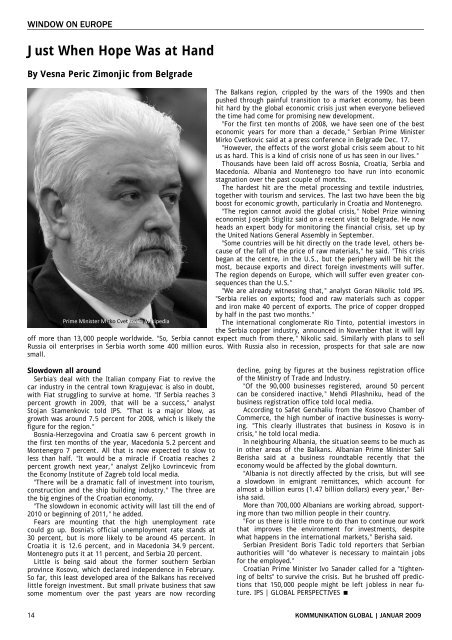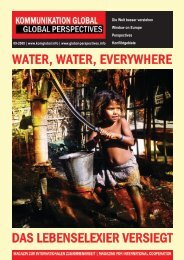GLOBAL PERSPECTIVES | KOMMUNIKATION GLOBAL - 01 | 2009
GLOBAL PERSPECTIVES | KOMMUNIKATION GLOBAL - 01 | 2009
GLOBAL PERSPECTIVES | KOMMUNIKATION GLOBAL - 01 | 2009
Create successful ePaper yourself
Turn your PDF publications into a flip-book with our unique Google optimized e-Paper software.
WINDOW ON EUROPE<br />
Just When Hope Was at Hand<br />
By Vesna Peric Zimonjic from Belgrade<br />
The Balkans region, crippled by the wars of the 1990s and then<br />
pushed through painful transition to a market economy, has been<br />
hit hard by the global economic crisis just when everyone believed<br />
the time had come for promising new development.<br />
"For the first ten months of 2008, we have seen one of the best<br />
economic years for more than a decade," Serbian Prime Minister<br />
Mirko Cvetkovic said at a press conference in Belgrade Dec. 17.<br />
"However, the effects of the worst global crisis seem about to hit<br />
us as hard. This is a kind of crisis none of us has seen in our lives."<br />
Thousands have been laid off across Bosnia, Croatia, Serbia and<br />
Macedonia. Albania and Montenegro too have run into economic<br />
stagnation over the past couple of months.<br />
The hardest hit are the metal processing and textile industries,<br />
together with tourism and services. The last two have been the big<br />
boost for economic growth, particularly in Croatia and Montenegro.<br />
"The region cannot avoid the global crisis," Nobel Prize winning<br />
economist Joseph Stiglitz said on a recent visit to Belgrade. He now<br />
heads an expert body for monitoring the financial crisis, set up by<br />
the United Nations General Assembly in September.<br />
"Some countries will be hit directly on the trade level, others because<br />
of the fall of the price of raw materials," he said. "This crisis<br />
began at the centre, in the U.S., but the periphery will be hit the<br />
most, because exports and direct foreign investments will suffer.<br />
The region depends on Europe, which will suffer even greater consequences<br />
than the U.S."<br />
"We are already witnessing that," analyst Goran Nikolic told IPS.<br />
"Serbia relies on exports; food and raw materials such as copper<br />
and iron make 40 percent of exports. The price of copper dropped<br />
by half in the past two months."<br />
Prime Minister Mirko Cvetkovic |Wikipedia<br />
The international conglomerate Rio Tinto, potential investors in<br />
the Serbia copper industry, announced in November that it will lay<br />
off more than 13,000 people worldwide. "So, Serbia cannot expect much from there," Nikolic said. Similarly with plans to sell<br />
Russia oil enterprises in Serbia worth some 400 million euros. With Russia also in recession, prospects for that sale are now<br />
small.<br />
Slowdown all around<br />
Serbia's deal with the Italian company Fiat to revive the<br />
car industry in the central town Kragujevac is also in doubt,<br />
with Fiat struggling to survive at home. "If Serbia reaches 3<br />
percent growth in <strong>2009</strong>, that will be a success," analyst<br />
Stojan Stamenkovic told IPS. "That is a major blow, as<br />
growth was around 7.5 percent for 2008, which is likely the<br />
figure for the region."<br />
Bosnia-Herzegovina and Croatia saw 6 percent growth in<br />
the first ten months of the year, Macedonia 5.2 percent and<br />
Montenegro 7 percent. All that is now expected to slow to<br />
less than half. "It would be a miracle if Croatia reaches 2<br />
percent growth next year," analyst Zeljko Lovrincevic from<br />
the Economy Institute of Zagreb told local media.<br />
"There will be a dramatic fall of investment into tourism,<br />
construction and the ship building industry." The three are<br />
the big engines of the Croatian economy.<br />
"The slowdown in economic activity will last till the end of<br />
2<strong>01</strong>0 or beginning of 2<strong>01</strong>1," he added.<br />
Fears are mounting that the high unemployment rate<br />
could go up. Bosnia's official unemployment rate stands at<br />
30 percent, but is more likely to be around 45 percent. In<br />
Croatia it is 12.6 percent, and in Macedonia 34.9 percent.<br />
Montenegro puts it at 11 percent, and Serbia 20 percent.<br />
Little is being said about the former southern Serbian<br />
province Kosovo, which declared independence in February.<br />
So far, this least developed area of the Balkans has received<br />
little foreign investment. But small private business that saw<br />
some momentum over the past years are now recording<br />
decline, going by figures at the business registration office<br />
of the Ministry of Trade and Industry.<br />
"Of the 90,000 businesses registered, around 50 percent<br />
can be considered inactive," Mehdi Pllashniku, head of the<br />
business registration office told local media.<br />
According to Safet Gerxhaliu from the Kosovo Chamber of<br />
Commerce, the high number of inactive businesses is worrying.<br />
"This clearly illustrates that business in Kosovo is in<br />
crisis," he told local media.<br />
In neighbouring Albania, the situation seems to be much as<br />
in other areas of the Balkans. Albanian Prime Minister Sali<br />
Berisha said at a business roundtable recently that the<br />
economy would be affected by the global downturn.<br />
"Albania is not directly affected by the crisis, but will see<br />
a slowdown in emigrant remittances, which account for<br />
almost a billion euros (1.47 billion dollars) every year," Berisha<br />
said.<br />
More than 700,000 Albanians are working abroad, supporting<br />
more than two million people in their country.<br />
"For us there is little more to do than to continue our work<br />
that improves the environment for investments, despite<br />
what happens in the international markets," Berisha said.<br />
Serbian President Boris Tadic told reporters that Serbian<br />
authorities will "do whatever is necessary to maintain jobs<br />
for the employed."<br />
Croatian Prime Minister Ivo Sanader called for a "tightening<br />
of belts" to survive the crisis. But he brushed off predictions<br />
that 150,000 people might be left jobless in near future.<br />
IPS | <strong>GLOBAL</strong> <strong>PERSPECTIVES</strong> �<br />
14 <strong>KOMMUNIKATION</strong> <strong>GLOBAL</strong> | JANUAR <strong>2009</strong>















